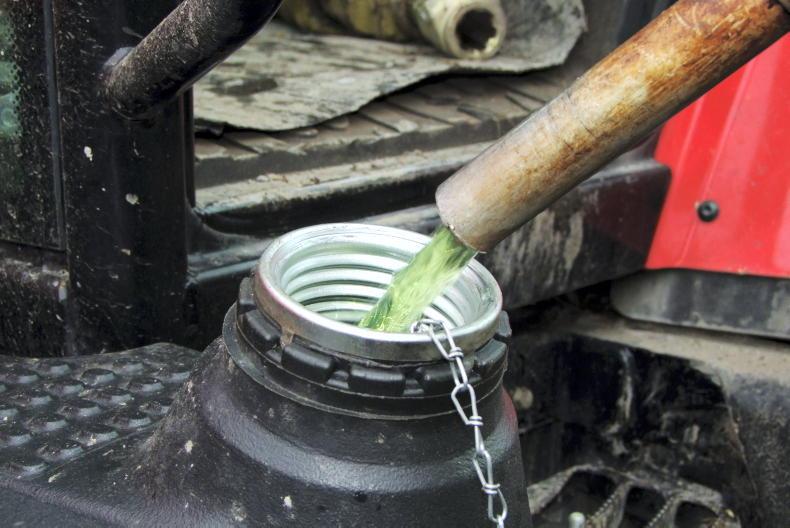Anything that gets called a fossil fuel subsidy is in the firing line and favourable tax treatment for any form of fossil fuel consumption, regardless of the economic rationale, is in question.
It appears to have escaped the attention of the farm organisations but the entirety of the tax differential between road diesel and green diesel has been classified as a fossil fuel subsidy in recent publications from the Central Statistics Office and from the tax strategy group at the Department of Finance.
Green diesel, or mineral gas oil (MGO) in the language of the Revenue Commissioners, is used mainly on farms and in home heating
This makes no economic sense, but the stage has been set for calls to eradicate the differential. Green diesel, or mineral gas oil (MGO) in the language of the Revenue Commissioners, is used mainly on farms and in home heating.
Neither tractors nor houses travel the road network every day and so MGO has been taxed at a lower rate than auto-diesel, even though the ex-refinery price is pretty much the same and the two kinds of diesel have almost the same carbon emissions.
The switch to renewable energy is unavoidable and taxing carbon emissions makes perfect sense
Road users are expected to contribute to the very substantial costs of providing the road network and the tax on road diesel and on petrol is one of the user charges, along with purchase taxes and the annual car tax.
The sums involved are serious and run into billions per annum.
Road diesel is the only fuel available for trucks and buses, and the car fleet has become more reliant on diesel in recent times
The switch to renewable energy is unavoidable and taxing carbon emissions makes perfect sense, but the higher rate of tax on automotive fuels was around long before the climate emergency and lower rates for non-automotive uses should not be misdescribed as fossil subsidies.
Road diesel is the only fuel available for trucks and buses, and the car fleet has become more reliant on diesel in recent times.
For automotive use, diesel now outsells petrol by a large margin.
Fuel tax is the main component of road user charging in Ireland, as in other European countries. At present, road diesel costs around €1.40/l, while green diesel is around €0.86/l.
VAT on road diesel comes on top at the full 23% rate
Tax is the reason for the discount – after the recent surge in world oil markets, the pre-tax price of diesel of either variety is around 62c/l, but road diesel pays far more excise duty, 43c/l v just 5c/l for green diesel. Both pay about 9c/l in the form of the carbon tax. VAT on road diesel comes on top at the full 23% rate. Green diesel pays VAT at the lower 13.5% rate.
The price buildup for the two products is shown in Figure 1.
There should be no complaints that the carbon charge on green diesel is the same as on road diesel.
The carbon charge is there for a reason, and the Green Party is correct, and should be supported, in its insistence that the consumption tax on all sources of carbon emissions needs to rise.
The next budget will likely see the carbon component of the tax on green diesel, and on petrol increase by a couple of cents per litre, and so will the charge on road diesel and home heating oil.
The inclusion of green diesel in the lower 13.5% VAT band is a policy choice. There are bigger anomalies – jet fuel and marine diesel are exempt altogether – but the excise differential is the main source of the price difference at the pump.
If the Government succeeds over the decades to come in converting much of the road fleet to electric traction, there will be a loss to State income
There are very sound reasons why diesel for automotive uses should attract a higher tax charge.
If the Government succeeds over the decades to come in converting much of the road fleet to electric traction, there will be a loss to State income, since the motor fuel tax is such a big source of revenue.
The actual carbon tax is €35.50/t and should rise, most likely at €7 or €8 per annum, until it gets up to €80 or €100
The CSO report, which characterised the motor fuel tax as the “normal” against which lower rates should be misclassified as subsidies, noted that Ireland’s current tax on road diesel works out at €259/t carbon.
The actual carbon tax is €35.50/t and should rise, most likely at €7 or €8 per annum, until it gets up to €80 or €100. But, nobody, not even the most energised of green campaigners, thinks it should ever reach €259.
User charges
The current excise figure reflects the perceived need to collect user charges from those who traverse the road system, not just the penalisation of emissions, and most tractors rarely leave the farm.
The farm organisations need to pay close attention to the emerging debate about climate action and taxes. It is not all about herd limits.









SHARING OPTIONS